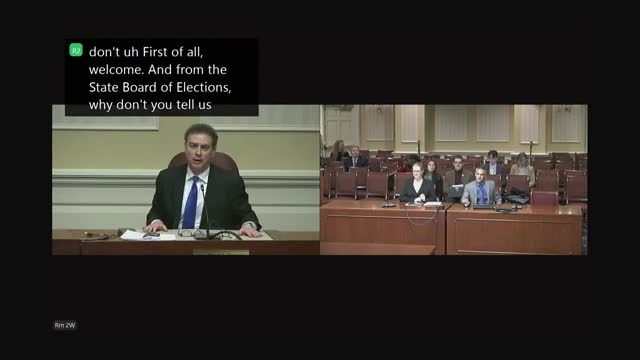State elections administrator reviews 2024 operations, announces procurement timing and audit plans
Get AI-powered insights, summaries, and transcripts
Subscribe
Summary
Jared Tavares, State Administrator of Elections, briefed the Education, Energy, and the Environment Committee on the 2024 election cycle, describing turnout trends, security and outreach work, a canceled poll book contract and procurement of 138 replacement poll books, and a decision to delay implementing a new statewide voting system until 2028.
Jared Tavares, State Administrator of Elections, told the Education, Energy, and the Environment Committee that Maryland’s State Board of Elections (SBE) has reorganized staff, strengthened security and outreach, and handled several unforeseen events during the 2024 election cycle while preparing for 2026 and beyond.
Tavares said the SBE canceled a poll-book contract in January 2024 after the vendor’s product failed to meet statewide minimum requirements, executed a contingency plan using existing equipment and procured 138 additional poll books from Georgia. He also said the board decided not to deploy a newly procured voting system for 2026 because vendors certified to the Election Assistance Commission’s updated voluntary guidelines (VVG 2.0) are not yet available; the board plans to aim implementation for the 2028 election instead while continuing the procurement process now.
Why it matters: The SBE’s decisions affect how local boards prepare for upcoming elections, how quickly results can be canvassed and certified, and the technical tools local jurisdictions will use when voting begins in earnest for 2026 and future elections.
Tavares summarized turnout and voting-method trends from 2024: primary turnout was about 1 million (roughly 27% of eligible voters); general election turnout exceeded 3 million (about 72% of eligible voters). He said in-person voting remained the most common method, mail ballots accounted for roughly one-quarter of general-election votes, and provisional ballots were historically high (he cited nearly 150,000 provisional ballots in the general election). Tavares also said same-day registration surged: roughly 58,000 people registered and voted on the same day during the 2024 general election.
On security and threats, Tavares told the committee the SBE received threatening letters before the election and bomb threats during the canvass at local election offices; he credited the passage of the Protecting Election Officials Act (Senate Bill 480) with helping provide protections for election staff. He said the agency conducts weekly cyber-hygiene scans with federal partners and runs physical security checks, and that a new in-house chief information security officer (CISO) has been hired.
Tavares described a multi-pronged outreach campaign the SBE ran for 2024, including paid TV, radio and digital advertising, multilingual materials and targeted efforts to engage historically disenfranchised groups. He said the SBE ran a language-assistance pilot in Prince George’s County, designated a Native American advocacy group as a voter-registration agency for the centennial of Native American voting rights, and expanded a voter address confidentiality program for survivors of domestic violence.
On mail and web ballot delivery, Tavares warned that web-delivered ballots have lower return rates than traditional mailed ballots and create significant local processing burdens because web ballots must be duplicated and reviewed by bipartisan teams. He said web-ballot delivery return rates were materially lower (he cited a gap between low-70s return rate for web delivery versus high-80s for mail) and described local-level operational impacts on canvass timelines.
The SBE told the committee it will conduct both automated and manual post-election audits: an automated audit of ballot images by an independent vendor and a manual hand-tally audit of sampled precincts and provisional/mail ballots, with local boards expected to complete audit work by March (local boards have until March to finish the manual audits). Tavares also said the agency successfully piloted a risk-limiting audit in Harford County.
Procurement and technology: Tavares said the SBE has an active project team for poll-book modernization and a request-for-proposal approved by the Department of Information Technology. He said the new statewide voting-system procurement will continue (specs and testing work is underway), but the board will not deploy a new voting system for 2026 because EAC 2.0-certified vendors are not yet available; delaying implementation to 2028 should allow broader vendor competition and more thorough local testing. The SBE also reported transition planning for a new campaign-finance reporting system (MDCRIS) and ongoing work on a new voter-registration and election-management system to support redistricting.
Committee members pressed on specific items. The committee vice chair praised the briefing and asked about a new communications director; Tavares said the communications post will manage internal media relations and project-manage outside vendors that place ads. Senators asked about the 10-day certification window for mail ballots (Tavares explained Maryland law allows ballots postmarked by election day to arrive within 10 days and that this window helps include military and overseas voters). He also confirmed that if a local jurisdiction delays certification, officials who are to be sworn in must wait until certification is complete.
On election-judge recruitment and partisan balance, Tavares reiterated that election judges operate in a nonpartisan capacity while on duty and that recruitment and even distribution of party-affiliated judges remains a challenge in some counties because voter-registration composition differs by jurisdiction.
Tavares closed by listing legislative items that affect the SBE’s workload — including Senate Bill 480 (Protections for election officials), Senate Bill 417 (election director evaluation requirements) and Senate Bill 115 (recount procedures) — and by describing ongoing priorities: redistricting readiness, expanding language-assistance programs, strengthening local training and mentoring for election staff, and pursuing grants for technology improvements. "I might not always agree with you on all your issues, but I'm always willing to improve the process and the voting experience, and I'm always there to listen," Tavares said.
Ending: The committee heard the briefing and posed follow-up questions; Tavares opened the floor for questions before the hearing moved on to committee Q&A and scheduling matters.
